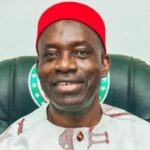LAST week, the Nigerian Press Organisation (NPO)comprising the Newspaper Proprietors’ Association of Nigeria (NPAN), the Nigerian Guild of Editors (NGE) and the Nigeria Union of Journalists (NUJ) constituted a nine-man board of the National Media Complaints Commission (NMCC) known as the National Ombudsman. According to a statement by the president of the NPAN and NPO, Mallam Kabiru Yusuf, the commission is a major step in strengthening public confidence in the media through the prompt resolution of issues bordering on ethical breaches in media content. Strategically, members of the commission were drawn from the media, the bar, the academia and civil society. They include Mr. Emeka Izeze, former Managing Director of Guardian Newspapers (Chairman); Mr. A B Mahmoud (SAN), former President of the Nigerian Bar Association (NBA) and member of the Body of Benchers; and Professor Chinyere Stella Okunna, Deputy Vice Chancellor (Academics), Paul University, Anambra State.
Other members are Dr. Hussaini Abdu, a development and humanitarian specialist and Country Director, Care International (Nigeria); Mr Lanre Idowu, Editor-in-Chief of Diamond Publications Limited and founder of the Diamond Awards For Media Excellence (DAME); Mr. Edetaen Ojo, Executive Director, Media Rights Agenda (MRA); Mrs Dupe Ajayi-Gbadebo, a journalist, lawyer, and arbitrator; Mrs. Eugenia Abu, broadcaster, author and columnist and Managing Partner/CEO, Eugenia Abu Media and the chair, House of Representatives Committee on Information. The statement added that the commission would serve as an independent forum for resolving complaints about the press quickly, fairly, and free of charge; maintain high standards of journalism and journalistic ethics, and defend the freedom of the press and the rights of the people to know.
It is indeed heartening that an ombudsman has been inaugurated after a long hiatus. During the halcyon days of yore, a veteran journalist, Alhaji Alade Odunewu, held sway as the country’s ombudsman. But after his demise, it became obvious that the office of the ombudsman would fare better as a robust institution that would continue irrespective of the circumstances surrounding an individual. The nine-member board of the NMCC comprising distinguished professionals is a movement in the direction. The quality of the membership of the board elicits excitement, although some practitioners fear the possibility of the past casting a shadow on the commission if it is not properly managed and focused when it hits the ground running. Surely, there is a lot to be gained from making the process of regulating the media more robust than it previously was. The NMCC has been put in place as the industry’s alternative to the government’s Nigerian Press Council (NPC) which the industry has consistently challenged as a vicious attempt at gagging the media. As a matter of fact, complaints about the constitution of the NPC are currently before the Supreme Court for adjudication.
Naturally, the industry is aware of the tendency towards misbehaviour where there is no regulation, hence the setting up of the NMCC for self-regulation or what has been described as co-regulation or peer regulation of media activities. And this is invaluable given that, outside of the government, the general public also has interest in media regulation. The public wants to be able to lodge complaints and seek redress where media organisations or workers are perceived to have misused their power. With the NMCC in place, self-regulation is strengthened. We suggest that the new body be robust, avoiding the pitfalls of the personification of state institutions. It must not be hijacked by those in government. Rather, it should keep to its terms of establishment, operations and activities. It must defend the industry and stakeholders and exercise due diligence and courage at all times to win public trust and confidence. In this regard, it should not be compromised on account of funding to guarantee trust in it as an institution.
We salute the NPO for coming up with this ombudsman. As it noted: “We expect the commission to serve as an independent forum for resolving complaints about the press quickly, fairly and free of charge; maintain high standards of journalism ethics; and defend the freedom of the press as well as the right of people to know. … The media is weary of government’s regulation, because politicians tend to have short goals. We are happy to submit to peer regulation by collaborating with civil society, business and the profession.” The industry, the public and the entire society will benefit if the commission takes the charge seriously and works hard to deliver on its delicate mandate.
.
YOU SHOULD NOT MISS THESE HEADLINES FROM NIGERIAN TRIBUNE
Treason: Obi, Datti’s comments don’t violate Section 37 of criminal code — Falana
Leading rights lawyer, Mr. Femi Falana on Thursday dismissed the claim by the Buhari administration that the Labour Party presidential team of Peter Obi and Datti Ahmed is engaging in subversive acts…
Obi threatens lawsuit against Peoples Gazette, says leaked audio fake
Presidential candidate of the Labour Party in the February 25 elections, Peter Obi, has dismissed leaked audio of an alleged conversation between him and Bishop David Oyedepo, founder of Living Faith Church Worldwide, as fake.…
Whitney Adeniran: Lagos govt places Chrisland school on probation
WATCH TOP VIDEOS FROM NIGERIAN TRIBUNE TV
- Let’s Talk About SELF-AWARENESS
- Is Your Confidence Mistaken for Pride? Let’s talk about it
- Is Etiquette About Perfection…Or Just Not Being Rude?
- Top Psychologist Reveal 3 Signs You’re Struggling With Imposter Syndrome
- Do You Pick Up Work-Related Calls at Midnight or Never? Let’s Talk About Boundaries






